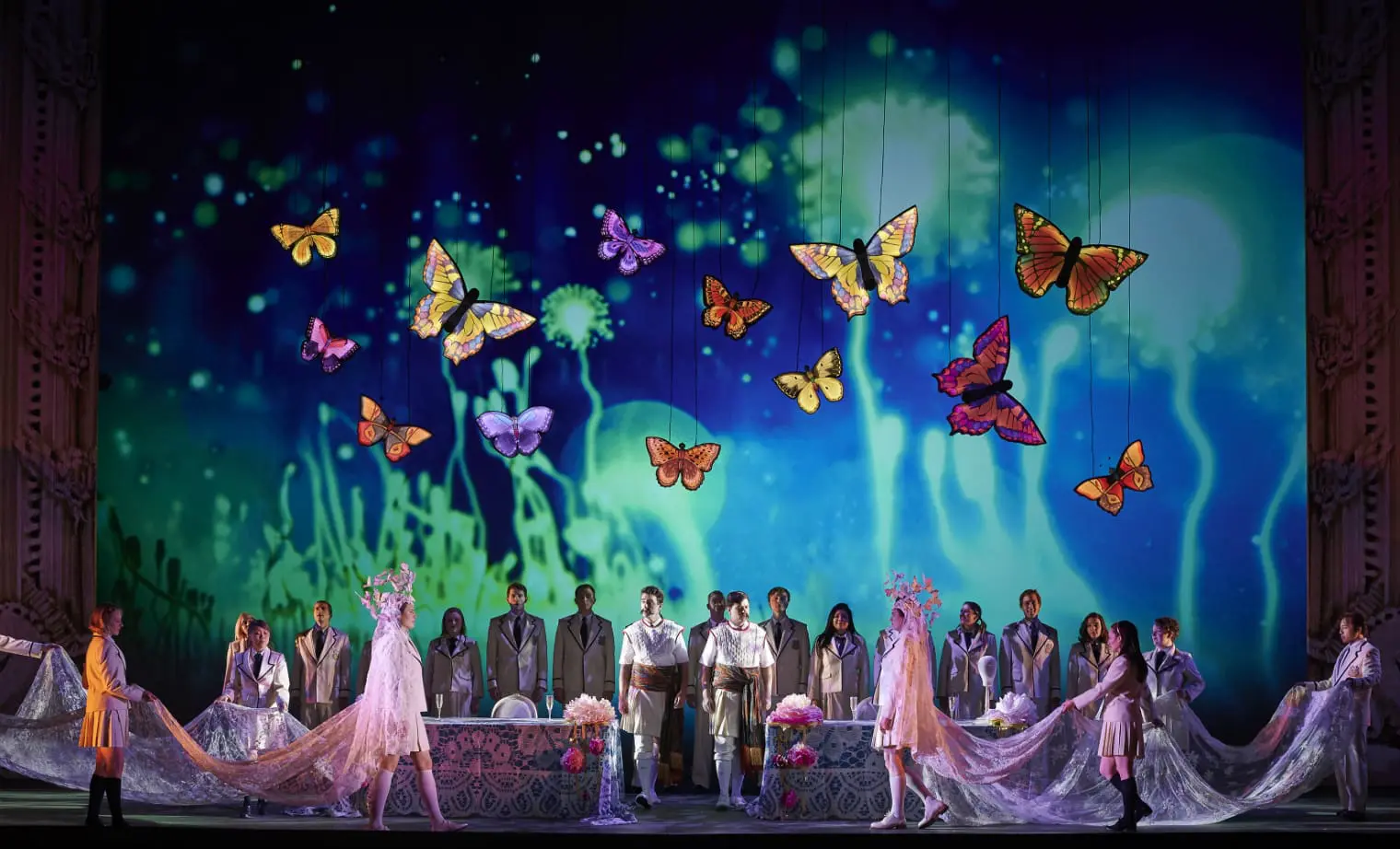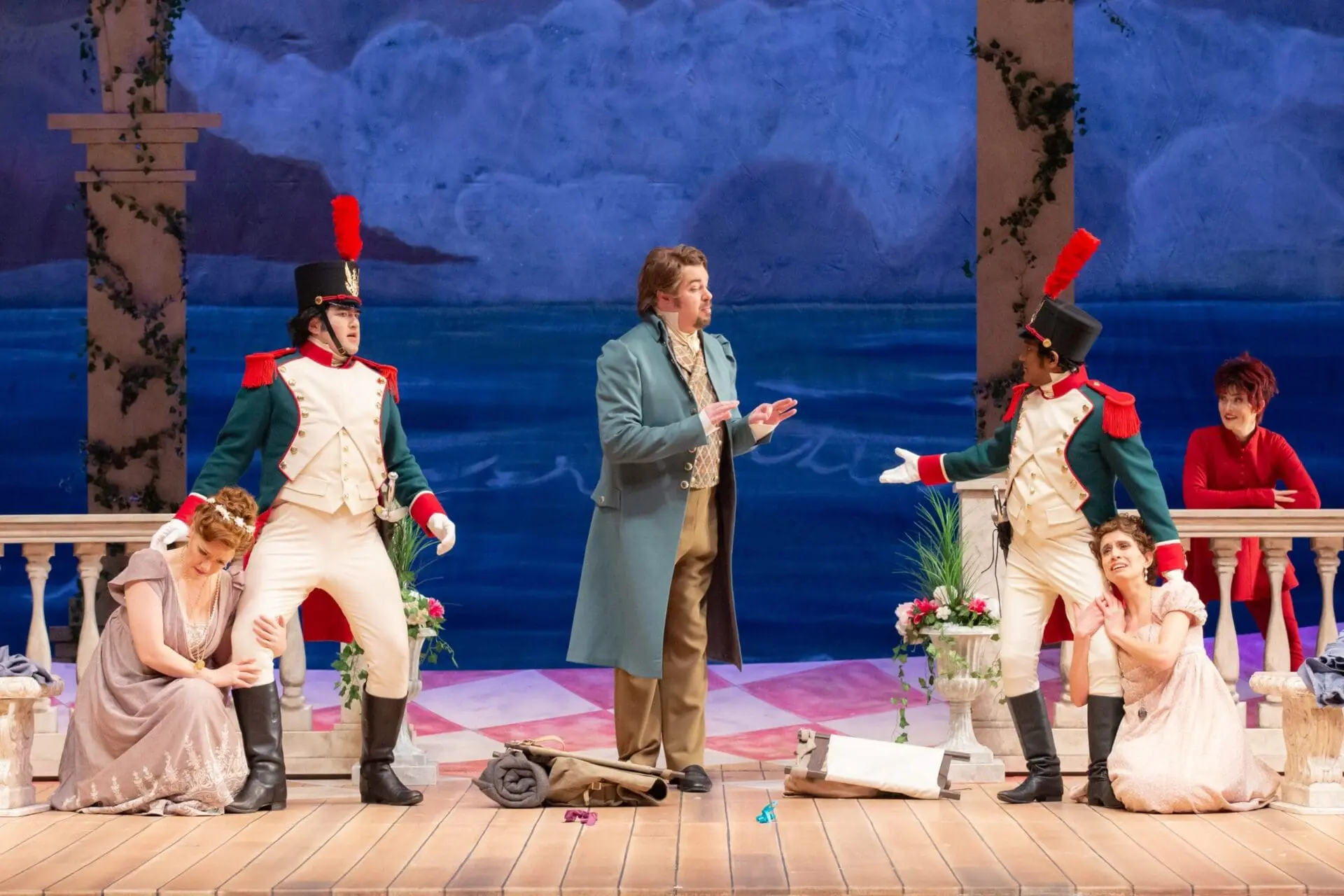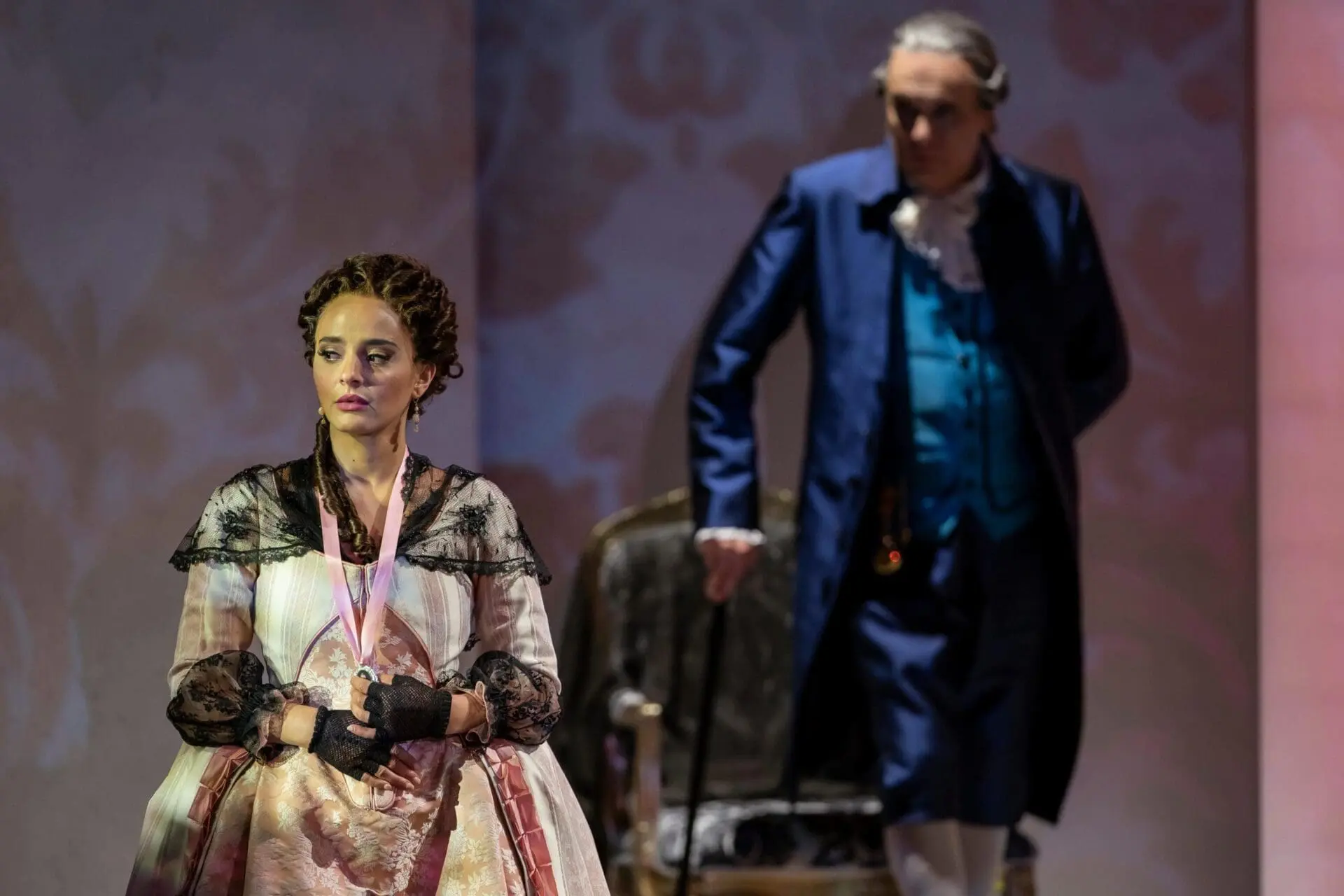The final Mozart-Da Ponte collaboration, 1790’s Cosí fan tutte, o sia La Scuola degli Amanti (Women Are Like That, or A School for Lovers) is hard to stage effectively. Atom Egoyan’s 2014 production, revived on Feb. 6th at the Canadian Opera Company, doesn’t quite get there, despite some improvements to his original concept. But to paraphrase that old break-up saw—it’s not Egoyan, it’s Da Ponte. The film director who gave us the breath-taking emotional intricacy of Cruel and Tender, Felicia’s Journey and Chloe could not entirely conquer the interminable Da Pontean confection in which vapid female protagonists act like mechanical dolls. Very few directors succeed. That Mozart wrote for it some of his most beautiful music makes things worse, paradoxically. All this dazzling music…for this?
Men transformed or disguised as strangers courting their own lovers in order to test their fidelity is not an unprecedented setup in European literature. It’s at least as old as Ovid’s Metamorphoses and recurs in Ariosto’s Orlando furioso, which Da Ponte likely used as a source. More directly, Cosí fan tutte is closer to Marivaux and his plays dealing with experimental psychology and games of seduction. In Marivaux’s 1744’s La Dispute, for example, a wealthy aristocrat, on whose orders two young women and two young men have been raised separately and in isolation, has them introduced to each other in a controlled environment. The idea is to test how humans behave in love, and determine which sex is more fickle. The couples form, then cross-form, and both sexes prove unreliable.
In Da Ponte’s Cosí fan tutte, it’s women who are singled out for inconstancy. Ferrando and Guglielmo temporarily leave the sisters Fiordiligi and Dorabella, ostensibly to go to war, only to appear back in town disguised as exotic foreigners. With the help of the experiment’s mastermind, Don Alfonso, and its executor, the maid Despina, each brother, in the course of a very arduous step-by-step process, manages to seduce the other man’s fiancée. At the end the ruse is revealed, and the women are astonished. The opera ends with everybody joining in the chorus: “Happy is the man who always / looks on the bright side / and through life’s ups and downs / lets himself be guided by reason.”
Egoyan and set and costume designer Debra Hanson honour the ‘school of lovers’ in the title with a prep school setting. The four protagonists are teenagers, the chorus are other students in school uniforms, observing and taking notes. Don Alfonso is a teacher and Despina, cleaning staff. In this production, there is no ruse, and the girls are ‘in on it’ from the beginning, playing along until they appear to genuinely fall for the other woman’s fiancé: those Act II arias are sung earnestly, not tongue-in-cheek. Egoyan’s directorial twist works until it doesn’t: the women have tricked the men but the libretto demands that the men trick the women and so, the big reveal at the opera’s conclusion is one big confusing non-conclusion. The question before any Cosí fan tutte production—‘how could the women have fallen for it?’—is here removed rather than answered. They don’t—but this creates its own dramatic problems along the way.

Emily D’Angelo (Dorabella) and Johannes Kammler (Guglielmo) in Canadian Opera Company’s Così fan tutte. Photo: Michael Cooper
Act I is full of activity and runs at a decent pace. Things come to a halt in Act II where one aria about feelings follows another in a never-ending revue. The six protagonists are capable and committed singer-actors to one. Mezzo-soprano Emily D’Angelo’s Dorabella behaved exactly like a teenager would, including her virtue-signaling in the aria, “Smanie implacabili,” upon hearing of the men’s departure. There was a lot of physical comedy in Act I, a lot of it from D’Angelo, and in some unexpected places too, like Fiordiligi’s aria “Come scoglio.”
Debuting German baritone Johannes Kammler as Guglielmo was a good foil for D’Angelo’s Dorabella—teddy-bear-like, youthfully overconfident, and genuinely hurt when Fiordiligi succumbs. Kirsten MacKinnon as Fiordiligi and Ben Bliss as Ferrando were the vocal revelations of the evening. MacKinnon was of fine and crystal clear voice from the start and then, masterly and free in the second half—her “Per pietà” was especially memorable. Hearing her elegant embellishments here and there was a bonus reward.

Ben Bliss (Ferrando) and Kirsten MacKinnon (Fiordiligi) in Canadian Opera Company’s Così fan tutte. Photo: Michael Cooper
Ben Bliss’s tenor is pure and polished and probably a bit larger than every other voice on stage, and his looks and demeanour, Ryan Gosling-esque. His arias “Un’aura amorosa” and “Tradito, schernito” were show stoppers. The roles of Don Alfonso and Despina were in the capable hands of Russell Braun and Tracy Dahl. The cast really performs as an ensemble, which wasn’t always the case when this production debuted.
Conductor Bernard Labadie let the voices shine, and the COC Orchestra was a discreet dance partner to the singers. The cello that played with the continuo fortepiano added a delicious colour to the recits. The woodwinds and the horn impressed whenever they came to the front of orchestral sound.
Finally, is the text of Cosí fan tutte misogynist? The M word has been associated with Cosí not a small number of times, but I’d say its worse sin is the tedium. What it has going in its favour is that female desire is not unspeakable or punishable by narrative death, as later becomes the case in 19th-century opera. Women’s desire also doesn’t appear to be naturally monogamous, and this is more comic than tragic. Then of course the biggest reason to enjoy Cosí fan tutte is Mozart’s music, with a wealth of pretty arias and hits like the trio, “Soave sia il vento”—one of those operatic chestnuts that has had an extensive life in popular culture for a reason.

Tracy Dahl (Despina) and Russell Braun (Don Alfonso) in Canadian Opera Company’s Così fan tutte. Photo: Michael Cooper
If you go to the opera primarily for the singing, this is just the ticket. If you need more than beautiful singing and beautiful sets, this production may leave you dissatisfied.
















